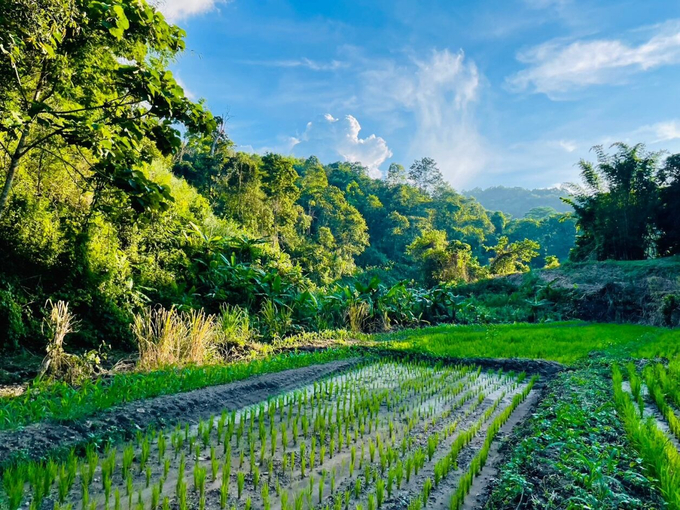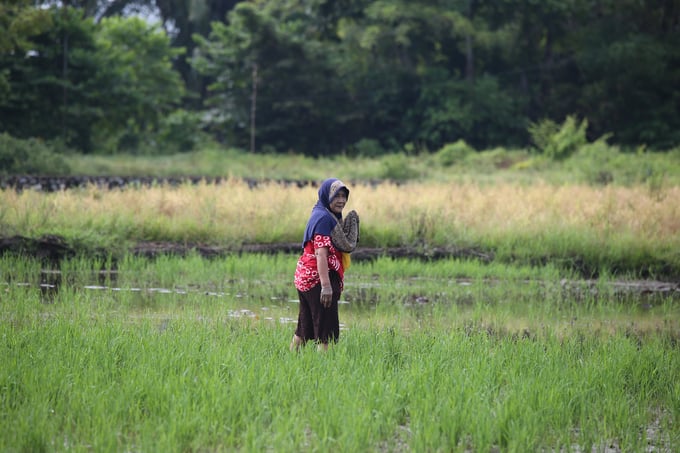May 20, 2025 | 11:27 GMT +7
May 20, 2025 | 11:27 GMT +7
Hotline: 0913.378.918
May 20, 2025 | 11:27 GMT +7
Hotline: 0913.378.918
The Food Systems, Land Use, and Restoration (FOLUR) initiative, supported by the Global Environment Facility (GEF), aims to transform agriculture by promoting sustainable farming practices, conserving biodiversity, and tackling climate change.
In Thailand, FOLUR’s ‘Inclusive Sustainable Rice Landscapes (ISRL)’ project has actively worked to transform the agriculture (rice) sector into a sustainable agricultural system through integrated land use, and natural resources and environmental management.
The ISRL project is funded by the Global Environment Facility (GEF) through a multi-focal area grant to address Biodiversity, Land Degradation, Climate Mitigation, and Food Systems, Land Use and Restoration (FOLUR) and by Germany’s Federal Ministry for Economic Cooperation and Development (BMZ), to transform agricultural production landscapes in Thailand (Ubon Ratchathani and Chiang Rai) to balance social, economic, and environmental interests.

The project’s approaches with 4 components including policy support on landscape-scale management for sustainable rice production, enhance the management of forests, watersheds, and biodiversity in two target provinces, establish finance mechanisms for sustainable rice production, knowledge management and outreach for national and regional upscaling. Photo: ISLR.
This involves transforming rice farming practices, which have traditionally been resource-intensive, into a more sustainable and ecologically system. The project aims to integrate land use and natural resource management with national policies, while also implementing landscape planning and management in key rice-producing provinces such as Chiang Rai and Ubon Ratchathani. The ultimate goal is to develop sustainable rice value chains and ensure that environmental practices are ingrained in the rice sector's investments and operations.
However, the implementation of low-emission rice practices in Thailand faces unique challenges. One of the most significant issues is the increasing unpredictability of weather patterns, which makes it difficult for farmers to rely on water availability for rice cultivation. Traditional methods of growing rice, which involve waterlogging the paddy fields, produce high levels of methane, a potent greenhouse gas. Additionally, there is a lack of soil nutrient testing prior to planting, leading to inefficient use of fertilizers.
The overuse of chemical fertilizers exacerbates the situation by releasing nitrous oxide, another harmful greenhouse gas. Furthermore, poor management of rice straw and stubble often results in open burning, causing severe haze pollution. Beyond these technical issues, the project also faces social challenges, including the complex process of engaging a wide range of stakeholders and the difficulty of motivating behavior change among farmers, especially when personnel changes occur frequently.
Despite these challenges, the ISRL project has achieved several milestones. Institutional arrangements have been established at both the national and provincial levels, ensuring a structured and coordinated approach to project implementation. This includes the appointment of a National Project Director at the Rice Department and the formation of Project Steering Committees at both the national and provincial levels. High-level political support from both Thailand and Germany has also strengthened the project, with the President of Germany, Dr. Frank-Walter Steinmeier, visiting one of the project sites in January 2024 alongside Thai ministers and officials.
In terms of direct engagement with farmers, the project has already trained over 7,300 smallholder farmers in Chiang Rai and Ubon Ratchathani, with 58% of the participants being women. The project’s approach to farmer engagement is particularly noteworthy for its inclusivity and community-based focus. Farmers are selected through a participatory process involving local government agencies, project teams, and community leaders. Once introduced to the project, surrounding farmers are informed about its activities and are given the freedom to decide whether to participate. This open and inclusive approach ensures that farmers have a say in the process and are aware of the potential benefits and challenges associated with joining the project.
The ISRL project represents a significant opportunity for Thailand to lead the way in sustainable rice production. By incorporating low-emission farming techniques and reducing reliance on resource-heavy practices such as waterlogged paddies and chemical fertilizers, the project is setting a model for other countries to follow. Farmer training and education are key components of this transformation, with the area-based landscape approach ensuring that local communities remain central to the process. As the project moves forward, its success in Chiang Rai and Ubon Ratchathani is expected to inspire replication across the country, contributing to broader regional efforts to combat climate change and promote sustainable agriculture.
As the ISRL project nears the end of its inception phase, the accomplishments so far highlight a promising future for sustainable farming in Thailand. Continued collaboration between government agencies, local communities, and international partners will be essential in scaling these efforts to address the pressing global challenges of food security, environmental sustainability, and climate change. By integrating policy support, landscape management, and farmer education, Thailand is paving the way for a rice sector that not only meets production needs but also protects the environment for future generations. This effort reflects a broader movement within Southeast Asia to prioritize sustainability in agriculture while empowering local farmers to be at the forefront of change.
For Indonesia, the FOLUR rice country project fosters strengthening food security, Increasing farmers’ welfare, building climate change mitigation and adaptation through agricultural best practices, etc.
The unique challenges and opportunities in implementing low-emission rice practices in Indonesia cover social, environmental, on-farm, economic, and off-farm factors. Social and institutional challenges include an aging farmer population, the need for strong farmer institutions, effective extension services, and the promotion of gender equity. Social acceptance of new agricultural knowledge is also vital, as is the creation of supportive policies and regulations at all government levels, from national to village. Research and development efforts focused on producing high-quality seeds and technology are critical for advancing sustainable practices.

A farmer overlooking the paddy field in Luwu, South Sulawesi. Photo: UNDP.
From an environmental standpoint, changes in land use, shifts in agricultural commodities, land degradation, and the increased risk of natural disasters such as floods pose significant hurdles. On the farm, maintaining soil fertility and ensuring the availability of planting materials, such as seeds and fertilizers, are key priorities. Farmers also face issues with pests and diseases and the need to implement Good Agricultural Practices (GAP). Utilizing composting facilities, improving water infrastructure, and adopting climate-smart agriculture techniques are crucial for sustainable farming.
Economically, there is a heavy dependency on government programs, including the provision of seeds and subsidized fertilizers. Farmers also face price fluctuations, asymmetric information, and limited financial literacy, all of which affect their ability to adapt to new practices. Off-farm challenges involve improving post-harvest handling practices, modernizing rice milling facilities, addressing the role of middlemen, and ensuring adequate food storage infrastructure like rice barns. These interconnected factors highlight the complexity of transitioning to low-emission rice systems, requiring a comprehensive and multi-sectoral approach.
A notable success story from the FOLUR project in Indonesia involves the piloting of a business model for sustainable rice production in Talang Bulawang Village, West Bajo, Luwu, South Sulawesi. This initiative brings together several key stakeholders, each playing a critical role in the implementation of sustainable farming practices. The Ministry of Agriculture provides essential assistance and technical guidance on cultivation methods, mechanization, and data validation, ensuring that farmers have access to the necessary knowledge and tools, etc.
The banking sector is also involved, offering social programs and technical assistance while coordinating with other institutions to support farmers financially. The state electricity company, Perusahaan Listrik Negara, contributes by ensuring that electrical needs are met through its social programs, which is crucial for mechanization and other modern farming techniques. Pupuk Indonesia, a leading agro-input holding company, supplies the required fertilizers and other inputs to improve agricultural productivity. At the heart of this collaboration are the farmers themselves, who are actively implementing sustainable farming practices, showcasing a community-based approach that could serve as a model for broader agricultural reform across Indonesia. This coordinated effort is a significant milestone in promoting sustainable rice production in the region.

(VAN) Attempts to bring down the price of the Japanese staple have had little effect amid a cost-of-living crisis.

(VAN) Fourth most important food crop in peril as Latin America and Caribbean suffer from slow-onset climate disaster.

(VAN) Shifting market dynamics and the noise around new legislation has propelled Trouw Nutrition’s research around early life nutrition in poultry. Today, it continues to be a key area of research.

(VAN) India is concerned about its food security and the livelihoods of its farmers if more US food imports are allowed.

(VAN) FAO's Director-General emphasises the need to work together to transform agrifood systems.

(VAN) Europe is facing its worst outbreak of foot-and-mouth since the start of the century.

(VAN) The central authorities, in early April, released a 10-year plan for rural vitalization.